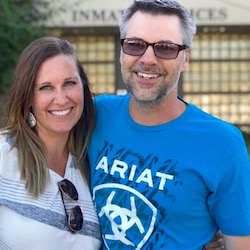 Joshua Horner and his wife, Kelli.
On December 31, 2014, 39-year-old Joshua Horner, a plumber in Redmond, Oregon, was indicted by a Deschutes County grand jury on charges of sexually assaulting his daughter over a seven-year period beginning in 2006 when she was five years old.
The indictment accused Horner of 17 counts of rape, sexual assault, and other sex offenses.
Horner divorced the girl’s mother in 2006 when their daughter, who was identified as A, was five.
In the summer of 2014, A, who was then 13 years old, was told that she would begin living every other week with Horner. At about the same time, Horner became engaged to a woman whom A did not like.
Upset with the proposed living arrangement, A told her mother for the first time that Horner had sexually molested her. An investigation was opened, which led to the grand jury indictment and Horner’s arrest.
In April 2017, Horner went to trial in Deschutes County Circuit Court.
A’s testimony was often disjointed, and at times she lost her composure on the witness stand or was unable to remember details of the alleged assaults.
The prosecution presented testimony from a doctor and a medical-health professional about how trauma in general and Post-Traumatic Stress Disorder in particular can impair a person’s memory. The defense sought to introduce evidence that the girl’s PTSD was a result of sexual abuse committed by her half-brother in 2009. It argued that the details of that abuse were relevant because they closely resembled some of the abuse that A said her father committed. However, the trial judge barred that evidence.
A said she remembered clearly the day that Horner shot their dog to death in front of A as punishment for refusing his sexual advances.
“He was just trying to touch me again, and I really had enough of it and Lucy had to pay for it,” A testified.
Prosecutors said that although they were unaware of this allegation before A took the witness stand, they had no reason to doubt its truth.
Horner testified and denied that he sexually assaulted A.
He denied shooting the dog and said he had given the black Lab away because the dog attacked a neighbor’s chickens. A veterinary technician testified she regularly examined a dog with the same name and appearance that was owned by the family that Horner said now owned Lucy.
The jury convicted Horner on April 12, 2017 on 15 of the 17 counts. He was acquitted of one count of unlawful use of a weapon and one count of first-degree sexual abuse. Unanimous verdicts are not required in Oregon, except in first-degree murder cases. Horner’s jury was unanimous on only one count—luring a minor. He was sentenced to 50 years in prison.
Six months after his conviction, Horner contacted the Oregon Innocence Project, which began reinvestigating the case.
On April 25, 2018, Horner’s appeals attorney, Ryan Scott, filed an appellate brief, asserting that the trial judge erroneously allowed A’s PTSD to be introduced as a potential reason for her memory lapses without the jury being told that it could have come from A’s previous sexual abuse by her half-brother.
The defense also argued that the trial judge should have allowed Horner’s trial lawyer to cross-examine A about her arrest on a charge of criminal mischief that occurred after Horner was indicted. The brief contended that A’s desire for leniency in that case was a motivation to testify favorably for the prosecution.
In addition, it also argued that the judge should have let Horner’s wife testify that she had seen Lucy at the dog’s current home during the trial.
At around the same time as the appeal was filed, the Oregon Innocence Project contacted Deschutes County District Attorney John Hummel. After hearing the organization’s concerns about Horner’s conviction, Hummel assigned an investigator to reexamine the case.
On June 29, Scott and the Oregon Office of the Attorney General filed a joint motion before the appellate court requesting a new trial, with the state conceding that the trial judge erred in excluding alternative explanations for the girl’s PTSD.
On July 26, 2018, the Oregon Court of Appeals reversed Horner’s conviction and ordered a new trial. Horner was released from the Eastern Oregon Correctional Facility in Pendleton on August 3.
Separate from Devore’s ruling, Horner’s claim of innocence received a decisive breakthrough on July 18, when an investigator for the Deschutes County District Attorney and a volunteer from the Oregon Innocence Project found Lucy after an extensive search. Lucy was living with new owners in Gearhart, a small town on the Oregon Coast. Her identity was established through pictures and records that showed how she had made her way some 200 miles northwest from Deschutes County.
When investigators with Hummel’s office attempted to inform A that Lucy was alive, she was uncooperative. She failed to show up for a scheduled meeting, and then refused to talk with investigators when they tracked her down.
On September 10, 2018, Judge Michael Adler granted Hummel’s motion to dismiss the charges.
In the motion, Hummel said that while he was not certain of Horner’s innocence, he was no longer convinced of his guilt. In addition, Hummel said that while prosecutors didn’t know that A’s testimony about Lucy was false when she gave it, they were still responsible for the truth of the evidence they presented.
“Mr. Horner, on behalf of the state of Oregon, I apologize that untrue evidence was used against you in your trial,” Hummel said during the hearing on his motion to dismiss. “That should happen to no one.”
– Ken Otterbourg
|